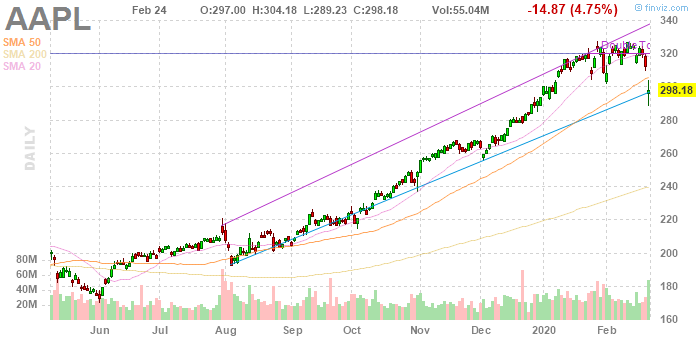There was nowhere to hide on Monday. Every sector in the S&P 500 declined. Every stock in the Dow Jones Industrial Average — all 30 of them — closed in the red. Verizon Communications (NYSE:VZ), with a 0.36% decline, was that index’s “best” performer. (UnitedHealth (NYSE:UNH) was the worst.)
The culprit broadly was cited as rising fears of the spreading coronavirus. But it’s possible too that markets, which have looked wobbly on occasion in 2020, were looking for a reason to fall … if not quite as far as they did on Monday.
In that context, Tuesday’s big stock charts focus on three of the largest U.S. stocks with significant exposure to China.
Unsurprisingly, these names had been a bit shaky to begin with. The question going forward is whether buyers will see the sell-off as an opportunity — or if Monday’s trading is just the beginning.
Apple (AAPL)
Generally speaking, investors haven’t done well to bet against Apple (NASDAQ:AAPL) for years now. But it’s worth noting that the first of Tuesday’s big stock charts does look bearish:
• The nearly 5% decline on Monday is concerning. But AAPL stock was struggling somewhat to begin with, establishing a bearish multiple top above $320. Now, shares have dipped below the 50-day moving average. The trend line from last year’s trading establishes a broadening ascending wedge — typically a bearish reversal pattern. There’s a scenario here in which Apple has a still-steep decline ahead, potentially to the 200-day MA currently around $240.
• Fundamentally, the news is a bit more mixed. By market standards, AAPL hardly looks expensive at less than 20x fiscal 2021 earnings per share estimates. The multiple is even cheaper backing out net cash. But Apple stock, even as it has gained nicely in recent years, typically has traded at a discount to the market. I’ve personally been bearish — indeed, too bearish — on the stock in the past before coming around to the case last year. Still, with iPhone sales potentially at or near a peak, a below-market valuation makes more sense than might initially appear.
• Right now, China looks like a hinge. It was easy to forget amid the literally historic rally in Apple stock, but less than 14 months ago, that market sent shares plunging. China weakness led to a guidance cut in early January 2019; AAPL dropped 8.5% on the news. That history, plus the chart, might color the case for buying Apple on the dip. It can get worse from here.
Starbucks (SBUX)
China represents a major growth market for Starbucks (NASDAQ:SBUX). The second of Tuesday’s big stock charts suggests that might be a problem — but there is some reason for hope:
• Purely from a technical perspective, Starbucks stock seems to be in trouble. Monday’s drop pushed the stock out of a pair of wedges. SBUX saw a “hammer chart” pattern yesterday, with shares closing well below morning levels and within pennies of the intraday low. A “death cross” is possible as well, as the 50-day moving average could cross the 200-day MA in the next few sessions.
• It’s possible buyers could step in, however. Support held in January around current levels, and in November not terribly below Monday’s close. SBUX still is cheap, but a 28x multiple to 2020 EPS estimates isn’t unreasonable in the context of projected mid-double-digit growth. SBUX is another name whose valuation I’ve personally questioned, but I haven’t yet seen much sign that the market as a whole is set to reverse its sentiment toward the stock.
• Pandemic fears admittedly might be enough to drive that reversal. Still, there’s been enough buying of recent declines and enough growth outside of China to suggest that Starbucks stock probably can hold up as long as broad markets do the same.
Caterpillar (CAT)
The problem for Caterpillar (NYSE:CAT) at the moment is simple. Caterpillar stock basically is a play on global macroeconomic growth — and that growth might be set for a slowdown. But at least on a relative basis, the third of Tuesday’s big stock charts looks potentially positive:
• Clearly, $140 has been established as a key level for CAT stock. It provided resistance in the middle of last year, and support more recently. But higher lows since August have established a bullish ascending triangle pattern. Caterpillar still has a chance to hold the 200-day moving average. Obviously, the chart doesn’t show an immediate breakout, but there’s definitely a “could be worse” sense to near-term trading.
• That’s not necessarily the case going further back. Caterpillar stock has stalled out since the end of 2017. Cyclical fears and broader Chinese weakness likely have played a role. Indeed, guidance for 2020 delivered with the Q4 earnings report in January was well below Wall Street expectations, with early coronavirus effects playing a role.
• Put another way, the good news for CAT stock is that expectations weren’t that high to begin with. At less than 13x forward earnings, they still aren’t. Investors probably won’t rush into the stock, but when broader sentiment turns up, there’s a case that Caterpillar stock will do the same.
Vince Martin has covered the financial industry for close to a decade for InvestorPlace.com and other outlets. He has no positions in any securities mentioned.



